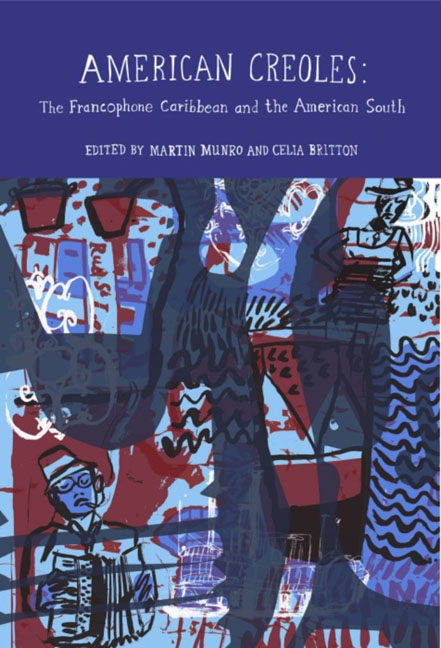Book contents
- Frontmatter
- Contents
- List of Illustrations
- Acknowledgements
- Introduction
- Creolizations
- Lafcadio Hearn's American Writings and the Creole Continuum
- Auguste Lussan's La Famille créole: How Saint-Domingue émigrés Became Louisiana Creoles
- Caribbean and Creole in New Orleans
- Creolizing Barack Obama
- Richard Price or the Canadian from Petite-Anse: The Potential and the Limitations of a Hybrid Anthropology
- Music
- Intertextualities: Faulkner, Glissant, Condé
- Notes on Contributors
- Index
Lafcadio Hearn's American Writings and the Creole Continuum
from Creolizations
- Frontmatter
- Contents
- List of Illustrations
- Acknowledgements
- Introduction
- Creolizations
- Lafcadio Hearn's American Writings and the Creole Continuum
- Auguste Lussan's La Famille créole: How Saint-Domingue émigrés Became Louisiana Creoles
- Caribbean and Creole in New Orleans
- Creolizing Barack Obama
- Richard Price or the Canadian from Petite-Anse: The Potential and the Limitations of a Hybrid Anthropology
- Music
- Intertextualities: Faulkner, Glissant, Condé
- Notes on Contributors
- Index
Summary
Les écrivains, de plus en plus, auront du mal à tracer leurs frontières. Signalons pour mémoire le cas extraordinaire de l'écrivain anglo-hellène, de nationalité américaine, Lafcadio Hearn qui, à la fin du XIXe siècle, recueillit les contes créoles de Louisiane et de la Martinique, vécut avec délices dans le Saint-Pierre d'avant l'éruption, publiant également des ouvrages pleins d'amour pour les paysages et les hommes martiniquais, paraissant un instant s'enraciner ici-là, avant de partir pour le … Japon où il épousa une femme du cru et écrivit des ouvrages en japonais. Homme à l'identité multiple, Lafcadio Hearn a eu l'intuition de la Diversalité.
Patrick Chamoiseau and Raphaël Confiant, Lettres créoles: tracées antillaises et continentales de la littérature, 1635–1975, pp. 169–70Lafcadio Hearn's Creole (Pre)Disposition
Lafcadio Hearn (1850–1904) is famous principally for having ‘interpreted’ Japan for the West in the closing years of the nineteenth century. Even if his life and work are recognized as falling into two main periods, the American and the Far Eastern, the latter is usually seen as outshining the former. It is less, however, the work of Hearn's Japanese period than the inscapes of his American/Caribbean writings that hold the key – if not to the overall significance, then certainly to the contemporary resonance of this unusual fin-de-siècle figure and of his work. These writings are clearly founded on what one might call a Creole gravitation. The object of this study is to show how the expression of Hearn's apparently inexorable Creole tropism illustrates a profound post-plantation cultural continuum which links the American Deep South to the Caribbean basin and also points forward to contemporary paradigms of cultural crossing, palimpsest or (as the authors of my epigraph put it, in a performative neologism) ‘diversalité’.
Not only does the idea of cultural continuum have, according to that epigraph, contemporary and universal purchase, but it is originally associated with specifically Creole spaces. The epigraph is a quotation from Lettres créoles, a literary survey of ‘Creole literature’ co-authored by two contemporary Martinican authors, Patrick Chamoiseau and Raphaël Confiant. Emphasizing the notion of continuum as a denial or cancellation of borders, the two Martinicans claim that it is becoming more and more difficult to ‘confine’ writers of the contemporary age within a single, simple label.
- Type
- Chapter
- Information
- American CreolesThe Francophone Caribbean and the American South, pp. 19 - 39Publisher: Liverpool University PressPrint publication year: 2012



